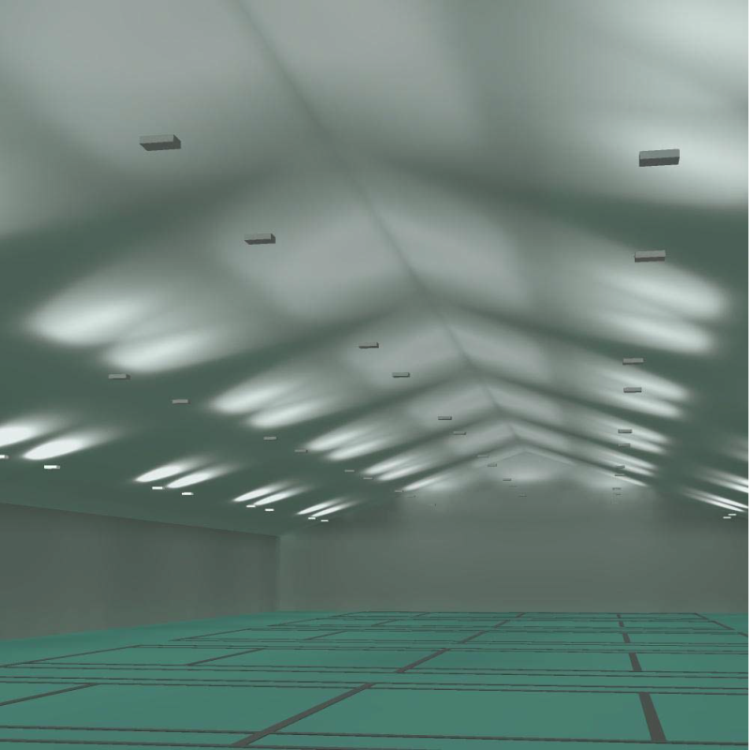Indoor Tennis Court Lighting Standards and recommended illumination for indoor tennis facilities.
| Class I | Class II | Class III | Class IV |
| Professional | College (2) | College (4) | High School (6) |
| International | Tennis Clubs (6) | High School (6) | Tennis Clubs (6) |
| Satellite. | Residential (6) | Tennis Clubs (6) | Parks & Recreation (6) |
| Challenger | Parks & Recreation (6) | Residential (6) | College (5) |
| College | Parks & Recreation (6) |
NOTES:
1. Class I facilities generally involve broadcast quality television production.
These facilities will include permanent spectator accommodations.
2. Facilities that host intercollegiate play, but without broadcast television requirements.
These facilities may have permanent or temporary seating.
3. Professional tennis events without broadcast television requirements.
4. Collegiate facilities primarily used for practice or for intramural or recreational play.
5. Collegiate facilities used strictly for recreational play.
6. Please note that some facility types appear in multiple categories. Illumination levels
for a specific facility should be chosen based on the highest skill level, or spectator and
television requirements that will take place at the facility. It is recognized that older
players require higher light levels. Facilities with older average player ages should be
designed for higher levels of light.
| Performance Criteria | Class I | Class II | Class III | Class IV |
| Average Maintained Horizontal Footcandles within PPA (1,2,4) |
125 (1250 lux) |
75 (750 lux) |
60 (600 lux) |
50 (500 lux) |
| Minimum Maintained Horizontal Footcandles within PPA (2,4) |
100 (1000 lux) |
60 (600 lux) |
50 (500 lux) |
40 (400 lux) |
| Maximum Uniformity Ratio (3) | 1.5 | 1.5 | 1.7 | 2.0 |
| Performance Criteria | Class I | Class II | Class III | Class IV |
| Average Maintained Vertical Footcandles within PPA (1,2,4) |
50 (500 lux) |
30 (300 lux) |
25 (250 lux) |
NA |
| Maximum Uniformity Ratio (3) | 2.0 | 3.0 | 3.0 | NA |
NOTE:
1. Maintained footcandles is determined by applying a light loss factor (LLF) to the
initial or measured footcandles. LLF is dependent upon lamp characteristics, fixture
maintenance, voltage variations and atmospheric conditions. It normally varies
between .6 and .85. Consult the Illuminating Engineering Society handbook and
fixture manufacturer’s publications for proper LLF values.
2. Average maintained and minimum maintained footcandles should be calculated
within the Primary Playing Area (PPA) with the footcandle values multiplied by the
appropriate LLF.
3. Uniformity ratio is defined as the ratio of the maximum footcandles divided by the
minimum footcandles.
4. Primary Playing Area (PPA) is defined as the area that includes 6’ beyond the
sidelines and 10’ behind the baseline.
Recommended Illumination are from Tennis Courts:A Construction and Maintenance Manual, ©2010 ASBA
 |
Buy Direct and Save $$$ – All of our lighting fixtures ship factory direct to your facility throughout the US and Canada. Call sales toll-free 1-844-LED PROS (1-844-533-7767)
[contact-form][contact-field label=’Name’ type=’name’ required=’1’/][contact-field label=’Email’ type=’email’ required=’1’/][contact-field label=’Website’ type=’url’/][contact-field label=’Comment’ type=’textarea’ required=’1’/][/contact-form]
